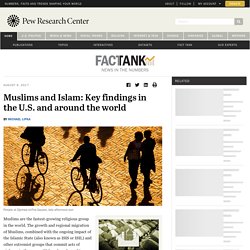

Muhammad and the Faith of Islam [ushistory.org] Courtesy Muslim Students Association, University of Southern California This verse from the Qur'an, originally written in Arabic, translates "Muhammad is the Messenger of Allah" (Qur'an 48:29) A man meditating alone in a cave near Mecca received a religious vision.
![Muhammad and the Faith of Islam [ushistory.org]](http://cdn.pearltrees.com/s/pic/th/muhammad-faith-islam-ushistory-232817592)
This vision laid the foundations for a new religion. Islam - Five Pillars, Nation of Islam & Definition. Islam is the second largest religion in the world after Christianity, with about 1.8 billion Muslims worldwide.
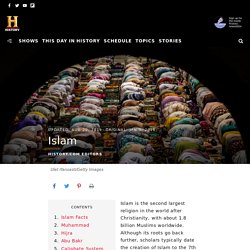
Although its roots go back further, scholars typically date the creation of Islam to the 7th century, making it the youngest of the major world religions. Islam started in Mecca, in modern-day Saudi Arabia, during the time of the prophet Muhammad’s life. Today, the faith is spreading rapidly throughout the world. Islam Facts The word “Islam” means “submission to the will of God.”Followers of Islam are called Muslims.Muslims are monotheistic and worship one, all-knowing God, who in Arabic is known as Allah.Followers of Islam aim to live a life of complete submission to Allah. Muhammad The prophet Muhammad, sometimes spelled Mohammed or Mohammad, was born in Mecca, Saudi Arabia, in 570 A.D. According to Islamic texts and tradition, an angel named Gabriel visited Muhammad in 610 A.D. while he was meditating in a cave. Hijra Abu Bakr Caliphate System Sunnis and Shiites Quran Sharia Law.
Basic Beliefs of Islam. Islam Fast Facts. Islam is partially based on the Judeo-Christian religions.
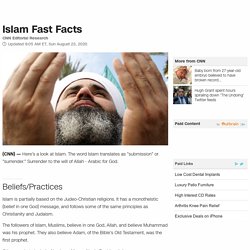
It has a monotheistic (belief in one God) message, and follows some of the same principles as Christianity and Judaism. How Muslims, Often Misunderstood, Are Thriving in America. This story appears in the May 2018 issue of National Geographic magazine.
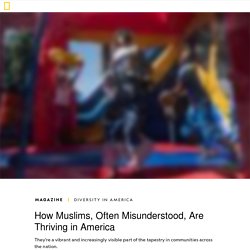
This story is part of Diversity in America, a National Geographic series covering racial, ethnic, and religious groups and examining their changing roles in 21st-century life. Tell us your story with #IDefineMe. There was nothing to do but watch as the copper-domed building in the southern Texas oil town of Victoria burned down. The mosque where Abe Ajrami’s Beyoncé-loving daughter was feted with other high school graduates, the mosque where his children went to religion classes, the mosque where he and his family went every Friday to pray and mingle over a potluck of seven-layer dip and spiced biryani, was gone. “I was trying not to break down,” says Ajrami, a Palestinian American who raced to the mosque after getting a phone call in the dead of night.
This family reminds me of my own. Born to a poor family in the Gaza Strip, Ajrami studied nursing because it was all he could afford. How Pew Research Center Conducted Its 2017 Survey of Muslim Americans. Islamophobia: Understanding Anti-Muslim Sentiment in the West. Introduction A phobia, according to the Merriam-Webster dictionary, is an exaggerated, usually inexplicable and illogical fear of a particular object, class of objects, or situation.
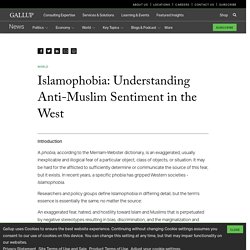
It may be hard for the afflicted to sufficiently determine or communicate the source of this fear, but it exists. In recent years, a specific phobia has gripped Western societies - Islamophobia. Eu.usatoday. America's Islamic Heritage Museum begins in the 1500s and explores the contributions of American Muslims through the 21st century.

USA TODAY WASHINGTON – One of the greatest stories rarely told about the long history of Muslim immigration to the United States stretching back hundreds of years is actually being told most days by Amir Muhammad, the founder and chief curator of America’s Islamic Heritage Museum, a tiny institution with a do-it-yourself collector’s vibe and a modest entrance fee that sits in an out-of-the-way corner of southeast Washington, D.C.
But, in an age of American political sectarianism when immigrant and minority-rights groups and U.S. lawmakers have blasted President Donald Trump’s incendiary comments, not many people are paying attention to the story Muhammad is revealing about the Muslim experience. "American Muslims haven't been great at explaining our side, at engaging with folks – you know? Not too many Americans come out here. Scanned Documents. Scanned Documents 2. History Detectives. When the first Muslims came to the land that would become the United States is unclear.
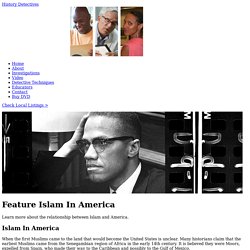
Many historians claim that the earliest Muslims came from the Senegambian region of Africa in the early 14th century. It is believed they were Moors, expelled from Spain, who made their way to the Caribbean and possibly to the Gulf of Mexico. When Columbus made his journey to the United States, it is said he took with him a book written by Portuguese Muslims who had navigated their way to the New World in the 12th century. Others claim there were Muslims, most notably a man named Istafan, who accompanied the Spanish as a guide to the New World in the early 16th century in their conquest of what would become Arizona and New Mexico.
What is clear is the make up of the first real wave of Muslims in the United States: African slaves of whom 10 to 15 percent were said to be Muslims. During the 1930s and 40s, Arab immigrants began to establish communities and build mosques. Muslims and Islam: Key findings in the U.S. and around the world. Try our email course on Muslims and Islam Learn about Muslims and Islam through four short lessons delivered to your inbox every other day.Sign up now!
